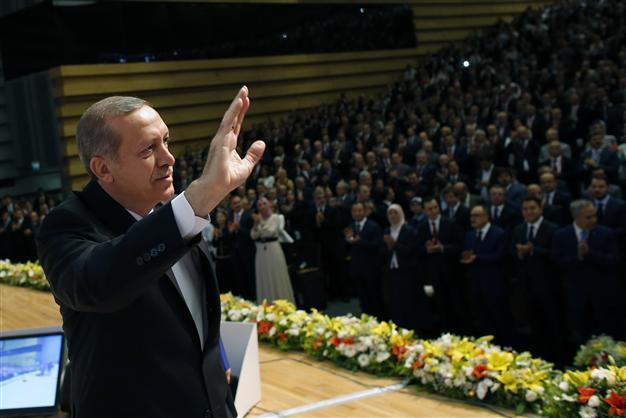Erdoğan promises an aggressive campaign, ambitious presidency

Prime Minister Recep Tayyip Erdoğan salutes members of his ruling AKP before the announcement that he is running for president next month in Ankara, July 1. AP Photo
Though it was not a surprise at all, some 4,000 supporters who were invited to Ankara for the occasion stood up in cheers and slogans to welcome Prime Minister Recep Tayyip Erdoğan’s candidacy to become Turkey’s next president.On July 1, Erdoğan became the third candidate to become the 12th president of the Turkish Republic. His competitors are Ekmeleddin İhsanoğlu, a non-partisan academic supported by two opposition parties – namely the social democratic Republican People’s Party (CHP) and the Nationalist Movement Party (MHP) – and Selahattin Demirtaş, the co-leader of the Kurdish problem-focused Peoples’ Democracy Party (HDP).
But Erdoğan considers neither of them to be serious rivals. He made clear in an hour long speech on July 1 that he wanted to be elected president in the first round of elections on Aug. 10 in which a 50 percent plus one vote is needed.
Erdoğan has passed that threshold, that rare 50 percent, once before in the 2011 general elections. And in the local elections on March 30 he managed to attract a dear 45 percent despite the wave of corruption allegations against members of his party, government and even family. So he sees the 50 percent threshold as a reachable target, with a little bit of a push, as a number of polls ordered by his AK Parti have shown.
On the other hand, the presence of these two candidates is no joke, no matter what the Erdoğan propaganda campaign has started to tell people. This is because the first target of the supporters of both candidates is to keep Erdoğan below 50 percent and to try and hit him hard in the second round, on Aug. 24, where only two candidates will be trying their best to win the majority.
Demirtaş has additional aims: He wants to get near to 10 percent of the vote, which is the constitutional threshold to be directly represented in Parliament (not valid for this election but as a psychological barrier for the coming parliamentary elections) with the help of votes from Turkish socialists, as well as Kurds. In this way, the HDP hopes to get a better bargaining position for the outlawed Kurdistan Workers’ Party (PKK), with which it shares almost similar grassroots, in respect to its dialogue with the Erdoğan government for a political settlement.
Therefore, Erdoğan sees that he has to do his best to win in the first round. Otherwise, he could be caught between a sort of political blackmail by the Kurds and pressure by the remaining opposition parties, which have no priority other than seeing Erdoğan lose a battle; any battle.
That’s why he did not hide July 1 that he has prepared an aggressive campaign for the presidency, in which he is likely to use the faith or religion factor a lot. He started his speech with a prayer and completed it with al-Fatiha, the “opening” verse of the Quran, underlining that he did not consider his candidacy to be a farewell to his party, but as “a new beginning.” He also underlined five times that he saw Aug. 10 as a new page in Turkey’s history, “an end to military tutelage.”
He also hinted at an ambitious presidency if he gets elected. He vowed not to allow the Kurdish dialogue process to stop, asked the government institutions to fine tune themselves for a new administration for economic growth, and also told his party that although he would not be under the same roof “from Aug. 10 onwards,” he would always be with them. The latter point implied a de facto breach of the Constitution, which suggests that the president should be impartial and at an equal distances to all parties.
In foreign policy, Erdoğan promised that Turkey would be “the voice of all the oppressed” from Afghanistan to Syria, from Somalia to Egypt, and those who refuse to be seen as “others,” meaning the West. At the same time, he said he would continue to seek to be a full member of the European Union.
With Erdoğan’s candidacy becoming clear, the first ever race in Turkey to elect its president by popular vote has officially started.











